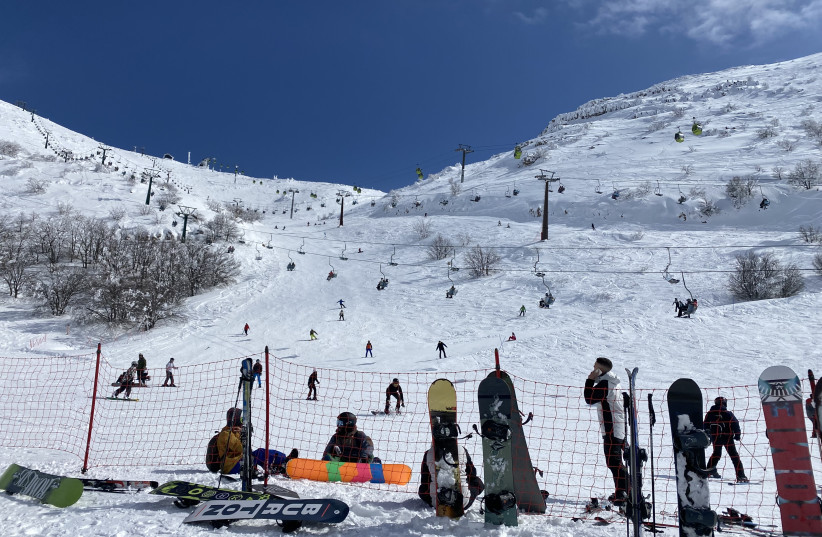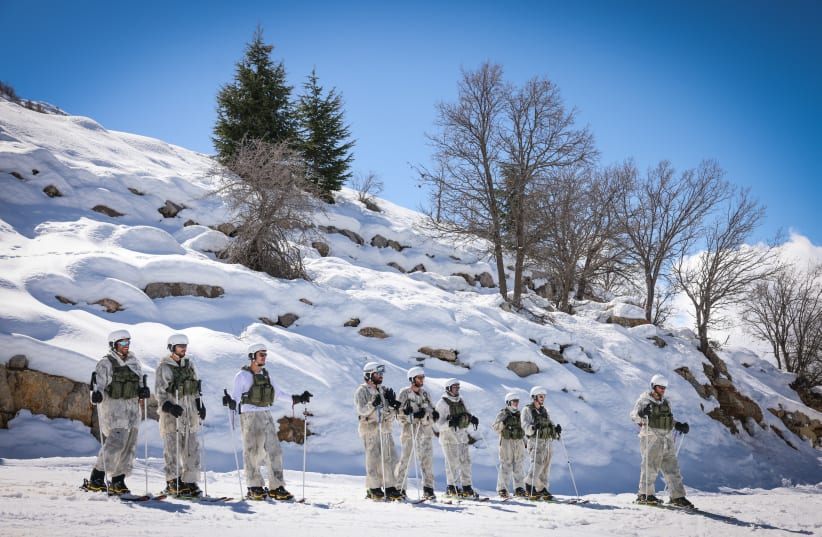For each of the last four winters, CEO Refael Nave of Mount Hermon ski area spent practically every day at the mountain, whose peaks straddle the borders of Syria, Lebanon, and Israel.
As the only place in Israel to see regular snowfall, the Hermon’s Israeli recreation area drew 400,000 visitors in the winter of 2022-’23. Some skied, but most came simply to experience snow, ride a gondola up to a lookout point at an altitude of 7,300 feet, sled and ride the Hermon’s mountain coaster. Over the summer, management invested in myriad upgrades in anticipation of even more visitors.
But this winter not a single paying visitor was able to come to the year-round attraction in the northern Golan Heights. The Hermon was shut down by military order on Oct. 7, the day Hamas terrorists flooded into southern Israel and set off a war that quickly spread to northern Israel. The mountain still hasn’t reopened to the public.
Not a single paying visitor came in the winter
Nave still spent much of this winter shuttling back and forth between the Hermon and his home in Neve Ativ, the alpine-style village that is the highest-altitude Jewish town in Israel. Except he did so armed with an automatic weapon and wearing military fatigues as a soldier in the reserves and a member of Neve Ativ’s security squad.
The Hermon, which doubles as a military zone and even in normal times has soldiers stationed at chairlifts, has come under frequent attack by Hezbollah over the last six months – including during Saturday’s attack by Iran. Nave is at the mountain almost every day, supervising maintenance work and coordinating with the army.
“The outposts in the Hermon come under fire all the time,” Nave said in an interview in Neve Ativ, his automatic rifle slung over his shoulder. “We’ve had winters before with a day closed here or there, but not like this.”


This is the first time since the ski mountain opened in the winter of 1968-’69 after Israel captured the area from Syria in the 1967 Six Day War that the Hermon has missed an entire season. As a consequence, the entire economy dependent on the mountain is suffering, affecting not just the 300 Hermon employees who have been furloughed but also the hotels, restaurants, sports shops, roadside vendors and other area businesses that depend on tourists.
“We’re 100% down from a regular year,” said Talia Welli, the owner of a sports store in the nearby Druze town of Mas’ade that sells sleds, winter coats, gloves and ski hats in addition to bicycles and other year-round equipment.
“In a regular winter there’s nonstop traffic here every morning and evening,” said a Welli employee who identified himself only as Hamed. “There would be lines at the restaurants. The Friday outdoor market that sells tourists everything from perfume to vegetables would be packed. This year there was nothing. Even the snow didn’t come.”
Israeli army flares fall over the northern Har Dov area on Mount Hermon on Nov. 13, 2023, amid increasing cross-border tensions between Lebanon’s Hezbollah and Israel as fighting continues with Hamas militants in the Gaza Strip. (Jalaa Marey/AFP via Getty Images)
Instead of looking for snow, residents of Mas’ade scan the skies for attacks by rocket or drone. Authorities installed concrete shelters on some streets to provide protection to the residents of Mas’ade, who typically don’t have bomb shelters in their homes, but during attacks most bystanders stay outside looking up, according to Hamed.
“People go outside to see what will fall,” he said. “A month ago we saw a drone shot down.”
On Saturday night, when Iran used over 300 ballistic missiles, drones and cruise missiles to attack Israel, the air raid siren in Masa’de sounded four times over the course of 10 minutes, all around 2 a.m. And on Wednesday, 18 people were injured in an Arab town in Israel’s north, though 60 miles west, when a rocket fired by Hezbollah from Lebanon struck a community center.
Closer to the Hermon, the town of Majdal Shams serves as the capital of the Golan’s Druze. According to the dictates of their opaque religion, Druze pay fealty to their home country — and because the Golan was seized from Syria during the 1967 war, local Druze ostensibly remain loyal to their “native country” of Syria. (Druze who live elsewhere in Israel are loyal Israelis, and many serve in the country’s military.)
The Golan Druze town of Majdal Shams on the slopes of the Hermon is the highest-altitude town in all of Israel, April 4, 2024. (Uriel Heilman)
But over the decades and particularly since the Assad regime stepped up its killing of Syrian civilians in that country’s civil war, enthusiasm for the principle of loyalty to Damascus has dwindled. Many Golan Druze, especially young people, have taken Israeli citizenship.
Shahbaa Abu Kheir runs the View Hotel in Majdal Shams, a two-year-old boutique hotel that overlooks small agricultural fields, cherry orchards and the Syrian border. Last winter, the 13-room hotel was fully booked almost every night, with rooms going for over $350 per night, including breakfast.
Then came Oct. 7.
“I had full bookings and everyone canceled to run to reserve duty that very day,” Abu Kheir recalled. Since then, the hotel has seen very few guests.
Shahbaa Abu Kheir, manager of the View Hotel in Majdal Shams, says that in normal times guests come to the hotel to gaze at the Syrian hilltops just beyond, April 4, 2024. Since the war began, they’ve stayed away. (Uriel Heilman)
“People are scared to come here because it’s a border area,” she said. “We have sirens only about once a week but there’s frequent booming from Israeli artillery fire toward Lebanon.”
As she was speaking, a Druze family of 10 from Daliyat al-Carmel, just south of Haifa, arrived for check-in. They were the only guests expected that night.
“The Druze are the only ones who come now,” Abu Kheir lamented. “We have no way of moving forward. It’s horrible.”
Israel’s government provides some compensation for some affected businesses and residents. However, eligibility and the amount depends on a number of factors, including location and type of business, and the compensation often is minimal, nonexistent or late to arrive.
For example, only in early April did the government announce it was extending its business compensation program for the months of January and February. Tourism- and agriculture-related businesses have easier eligibility requirements than other businesses. Businesses in the Golan aren’t eligible for the same compensation levels as businesses in the evacuation zone of the northern Galilee. Other determinative location criteria include what kinds of Homefront Command restrictions are in place there, the quantity of military activity, road closures, the presence of artillery batteries in the area and more.
The entrance to the Hermon is off-limits except to military traffic. The Israeli ski area comes under frequent fire from Hezbollah in Lebanon, April 4, 2024. (Uriel Heilman)
At the Hermon, any government aid that the furloughed workers receive constitutes only a fraction of their regular salaries, according to Nave.
“It’s a small amount. It’s not enough to live off of,” Nave said. “I just received my own payments for November and December and it barely covers my property taxes.”
In Nave’s case, he is able to receive the balance of his regular compensation because he is in active army reserve duty. That’s not the case for the vast majority of the Hermon’s regular workers, most of whom are Druze.
For these workers, as for everyone in northern Israel, the economic future is uncertain. It’s not clear how long the war and its aftereffects will last, and the government’s compensation criteria are in constant flux.
Sania Abu Saleh has a Druze restaurant in Majdal Shams at one of the last bends on the windy road that leads to the Hermon, next door to a ski equipment rental shop that stayed closed throughout this winter.
This ski and snowboard shop in Majdal Shams stayed closed all winter 2024 because the Hermon ski area was closed due to the war, April 4, 2024. (Uriel Heilman)
“Normally everybody stops by here to buy Druze pita. They eat hot corn. They sip tea and buy warm sachlav” — a thick milky drink made from corn starch, sugar and spices. “Now I have nothing. There are no people. There’s no work. Soldiers stop in from time to time but not many,” she said.
The gate to the Hermon sits just a few hundred yards up the road, and the military traffic in and out is constant.
The Hermon doesn’t use snowmaking equipment, so skiing depends entirely on the fickle weather. Last winter the mountain was able to open its ski runs for 27 days during the season. This winter, the chairlifts ran only when members of the Israel Defense Forces’ alpine unit needed to train. When a fierce snowstorm hit, members of the unit went out in the driving wind and snow to practice reaching their outposts by foot in the harshest conditions.
By early April, the only snow left on the mountain was at high altitude and mostly in Syrian territory, but the snowy summit was visible from most of the Golan and a big chunk of the northern Galilee. Because of the terrain, there’s no actual border fence in the area separating Israel from Syria and Lebanon.
Even in a regular year, when the Hermon is open to the public, the area is a heavily patrolled military zone. (Uriel Heilman)
At a ski expo in Europe that the Hermon’s CEO attended a couple of years ago, a snowmaking equipment company invited him to dinner along with some ski industry people from Lebanon. At first the Lebanese were taken aback to be dining with Israelis, Nave recalled, but they warmed up over the course of dinner.
After a long meal, Nave said, the Lebanese confessed that they had been taught from birth that Jews are evil and should be hated but that the experience of the evening had showed them otherwise. They finished the night with a l’chaim toasting a vision that one day peace might enable a joint ski pass connecting ski mountains in Lebanon, Israel and Syria.
These days Nave isn’t sanguine. On Saturday night during Iran’s attack, Israel took fire both from Lebanon and Syria.
“We want peace, but the reality is we have neighbors who don’t want us,” he said. “They’ve been training for years and years for this — to conquer all of the Galilee.”
Nave still has big dreams for the Hermon, the most ambitious of which would be the opening of a ski-in/ski-out hotel so guests can stay in the area overnight. But for now he’s setting his sights on something more mundane: reopening. It doesn’t seem like it will happen anytime soon.
“In my conversations with the military command I was told, ‘Let’s talk after the summer,’” Nave said. “How can we go on like this?”
